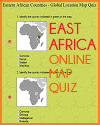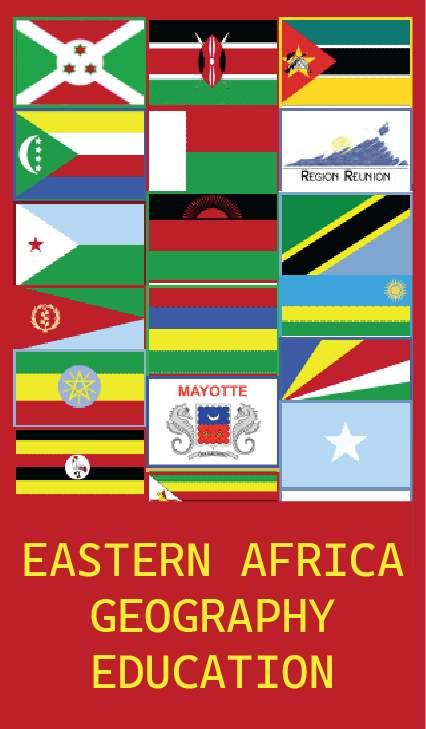Geography of Eastern Africa |
 |  |  |  |  | ||||||
| Burundi | Comoros | Djibouti | Eritrea | Ethiopia |
 |  |  |  |  | ||||||
| Kenya | Madagascar | Malawi | Mauritius | Mayotte |
 |  |  |  |  | ||||||
| Mozambique | Reunion | Rwanda | Seychelles | Somalia |
 |  |  |  |  | ||||||
| Uganda | United Republic of Tanzania | Zambia | Zimbabwe | East African Capitals Matching Worksheet |
 |  |  | ||||||||
| Eastern African Countries Handwriting and Spelling Worksheets | Country Capitals of Eastern Africa Energy Saver Game | Eastern Africa Multiple-choice Interactive Map Quiz |
|
Learning about the geography of eastern Africa is important for several reasons.
Geopolitical Significance: Eastern Africa is a region with considerable geopolitical importance. It includes countries like Ethiopia, Kenya, Tanzania, Uganda, and Somalia, which play significant roles in regional and international politics. Understanding the geography of these countries is essential for comprehending their impact on regional stability and global affairs.  Cultural Diversity: East Africa is known for its rich cultural diversity, with numerous ethnic groups, languages, and traditions. Learning about the geography of the region helps students appreciate the cultural variations within and between countries, fostering a more inclusive and culturally sensitive worldview.
Cultural Diversity: East Africa is known for its rich cultural diversity, with numerous ethnic groups, languages, and traditions. Learning about the geography of the region helps students appreciate the cultural variations within and between countries, fostering a more inclusive and culturally sensitive worldview. Economic Significance: Eastern Africa is home to various economies, ranging from agriculture to emerging industries. Understanding the geography of the region can provide insights into the economic opportunities and challenges facing these countries, which is important for trade, development, and international cooperation. Environmental Awareness: East Africa features diverse ecosystems, including the Great Rift Valley, savannas, mountains, and lakes. Learning about the geography of the region helps students understand the ecological diversity and environmental challenges, such as conservation efforts, climate change, and wildlife preservation. Historical Context: Geography is often intertwined with historical events and developments. Studying the geography of eastern Africa can provide context for historical events, including colonization, the struggle for independence, and contemporary issues like conflicts and political boundaries. Humanitarian Concerns: Eastern Africa has faced humanitarian challenges, such as food insecurity, droughts, and refugee crises. A strong grasp of the region's geography is crucial for understanding these issues, as well as for participating in humanitarian efforts and advocacy. Tourism and Travel: East Africa is a popular destination for tourists. Knowledge of the region's geography is vital for travelers, including understanding the layout of cities, topography, transportation networks, and tourist attractions. Global Perspective: In an increasingly interconnected world, understanding the geography of different regions fosters a global perspective. It allows students to appreciate the interconnectedness of nations, cultures, and economies and promotes cross-cultural communication and cooperation. Environmental Conservation: Eastern Africa is home to diverse and unique ecosystems and wildlife. Knowledge of the geography and ecology of the region is essential for those interested in environmental conservation and sustainability efforts. Crisis Response and Relief: In times of humanitarian or environmental crises, knowledge of eastern African geography is essential for effective response and relief efforts, as well as for understanding the geographical factors contributing to such crises. Overall, studying the geography of eastern Africa not only broadens students' knowledge of the world but also equips them with the tools to engage with the complex issues, cultures, and environments of this diverse and significant region. |






